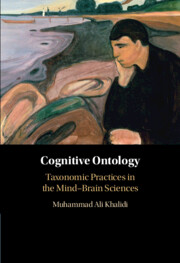Book contents
- Cognitive Ontology
- Cognitive Ontology
- Copyright page
- Dedication
- Contents
- Figures
- Contributors
- Preface
- Chapter 1 Cognitive Kinds
- Chapter 2 Concepts
- Chapter 3 Innateness
- Chapter 4 Domain Specificity
- Chapter 5 Episodic Memory
- Chapter 6 Language-Thought Processes
- Chapter 7 Cognitive Heuristics and Biases
- Chapter 8 Body Dysmorphic Disorder
- Chapter 9 Epilogue
- References
- Index
Chapter 8 - Body Dysmorphic Disorder
Published online by Cambridge University Press: 15 January 2023
- Cognitive Ontology
- Cognitive Ontology
- Copyright page
- Dedication
- Contents
- Figures
- Contributors
- Preface
- Chapter 1 Cognitive Kinds
- Chapter 2 Concepts
- Chapter 3 Innateness
- Chapter 4 Domain Specificity
- Chapter 5 Episodic Memory
- Chapter 6 Language-Thought Processes
- Chapter 7 Cognitive Heuristics and Biases
- Chapter 8 Body Dysmorphic Disorder
- Chapter 9 Epilogue
- References
- Index
Summary
This chapter tackles a psychiatric kind that does not pertain to cognitive science narrowly conceived, though it is strongly rooted in cognition. It concerns Body Dysmorphic Disorder (BDD), a condition that involves persistent and intrusive thoughts about a perceived bodily flaw that is not observable or appears slight to others, leading to repetitive behaviors and tending to result in significant distress or functional impairment. The chapter argues that the disorder has an important cognitive component involving certain deficits in visual processing, in interpreting the mental states of others, and in assessing evidence for and against one’s beliefs. A causal model of BDD is proposed that aims to show how its main features fit together. Based on this causal model, there are strong grounds for considering it a distinct psychiatric kind. This model implies a revision of the standard psychiatric taxonomy based on an analysis of the underlying causes of the disorder as opposed to its superficial symptoms. It also suggests the feasibility of constructing cognitive causal models of other psychiatric disorders.
Information
- Type
- Chapter
- Information
- Cognitive OntologyTaxonomic Practices in the Mind-Brain Sciences, pp. 210 - 230Publisher: Cambridge University PressPrint publication year: 2023
